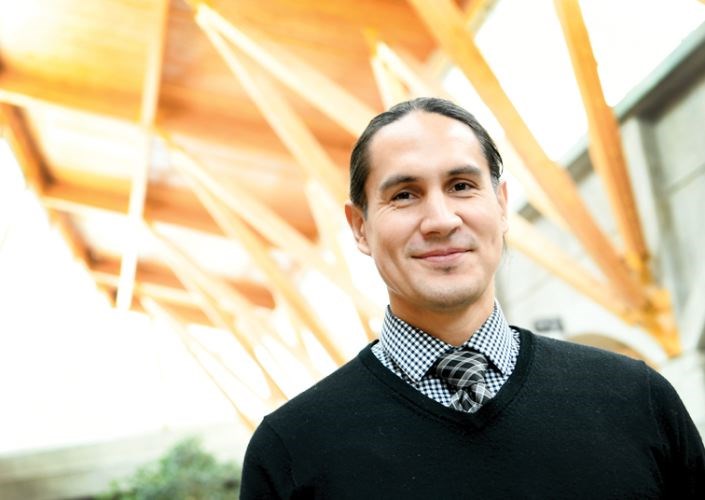A University of Calgary researcher and professor, whose past research examined education initiatives aimed at preventing young indigenous girls from entering the sex trade, has been named UNBC's first aboriginal scholar in residence.
Dustin Louie is originally from Nee Tahi Buhn and Nadleh Whut'en of the Carrier Nation. He grew up between Prince George, Fraser Lake and Burns Lake. An assistant professor at the University of Calgary's Werklund School of Education, he teaches courses related to indigenous education, social justice and educational philosophy. He will serve as the aboriginal scholar in residence at UNBC for a four-month term.
"It was unbelievably fortunate to get the opportunity to come back again. It was something that I've always looked forward to," Louie said at a reception at the university on Friday.
In a short speech, Louie acknowledged that universities and colleges have often reinforced western and colonial ideas about First Nations people.
"As so many of us have experienced when we were growing up in this area, there was a real separation between our communities and the education system in general - not only the schools that we were going to when we were younger, but this institution that is actually physically up on a hill, so separated from the areas that we were living in," Louie said.
"That gap between our communities and this space is becoming smaller and smaller. That's because these schools are starting to reach out to our communities."
Louie's dissertation examined preventative education for indigenous girls vulnerable to sexual exploitation. He said he initially picked the topic after researching ex-child soldiers in Uganda as part of a masters program. Although he initially planned to compare the experiences of these child soldiers with some of the experiences he had seen in first nations communities in Canada, he ended up focusing entirely on the experiences of indigenous women and girls.
"I started looking at gangs and I realized indigenous women are heavily involved in these gangs. They're just taking up different roles that aren't traditionally recognized," Louie said in an interview.
"When you think of gang members, you think of violence, drug dealing, things like that. But the sex trade is actually a pretty significant part of gangs. I started looking closer at their role in the sex trade and went from there."
Louie found that indigenous women are grossly overrepresented in the sex trade, and that many become involved between the ages of 10 and 13.
The research lead to preventative educational programming within reserves surrounding Calgary. Although focused on Cree, Ojibwa and Mtis communities, the research also resulted in an invitation as a guest lecturer at UNBC. Louie's lecture caught the attention of Rheanna Robinson, a senior advisor to the president of UNBC. Robinson had been inspired by a writer in residence program at the university and felt that an aboriginal scholar in residence program would also be a good fit.
"I thought this would be a really great opportunity to have students at UNBC come to know an aboriginal scholar that could work with them in a mentorship capacity, and also just be there to share life experiences and scholastic experiences through his journey," Robinson said.
For Louie, the opportunity to act as a mentor simply represents a chance to give back to the communities in which he was raised.
"The only reason I'm in the position I am is because communities around here supported me in getting here," he said.



